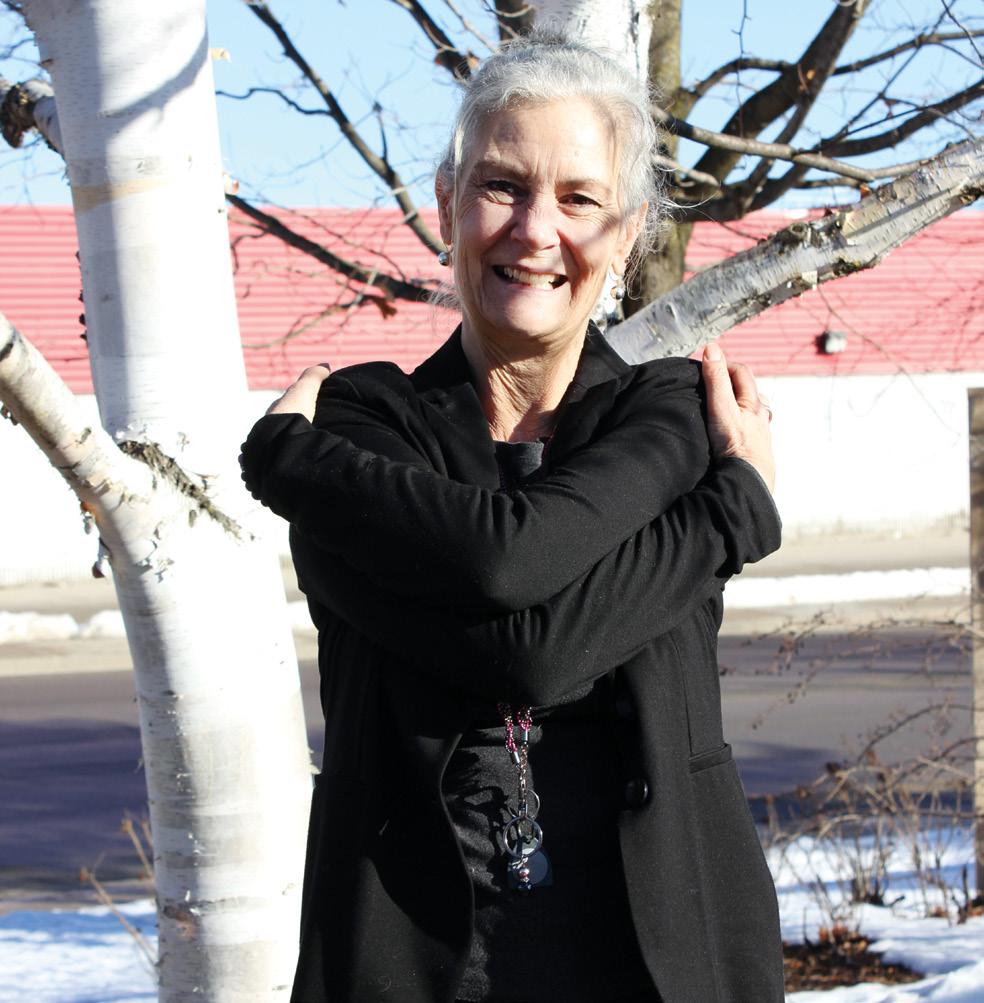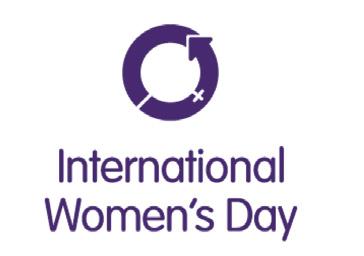
8 minute read
Embracing equity: IWD 2023
“Equity isn’t just a nice-to-have, it’s a must-have.”1
The theme for International Women’s Day (IWD) 2023 is “Embrace Equity.” The timing for digging into this couldn’t be better, as Family Transition Place (FTP) endeavours to understand what “equity” truly means and what we need to do to understand and embrace it fully.
At FTP, we have an understanding of the role gender in-equity plays in violence against women. We see it etched into the faces of the women who show up at our door. We recognize it in the long-standing cultural norms that are embedded in the fabric of our society and in the DNA of those who hold power and control. We see it in the women’s eyes, as they slowly start to recognize the outcome of that inequity, what the power imbalance has meant to them and their children, and the many ways it has disadvantaged them.
We see it in a relationship where they were the ones who experienced abuse, coercion, and violence, they were the ones who had to leave their homes and seek refuge in a shelter. The balance of power still tilts heavily in favour of the abuser (from a gendered lens, usually a man) who remains in the family home, keeping his job and his lifestyle intact.
A very real example that there is much work left to achieve gender equity has come out of the past three pandemic years: “The impact of the [COVID]-19 pandemic threatens to reverse decades of progress made towards gender equality, according to a global study that reveals women have been hit much harder socially and economically than men.2
“Women were particularly affected by loss of income and education, rises in domestic violence, child marriage and trafficking, and responsibility for caring for children and sick relatives, according to a comprehensive report published by the International Federation of Red Cross and Red Crescent Societies (IFRC) on Monday. ‘In a crisis, it is always women who pay the highest price,’ said Francesco Rocca, president of the IFRC.”3
The health care and not-for-profit sectors are, by a large margin, predominantly staffed by women. Over 75% of all paid employees are female. When COVID-19 hit, these were the people on the front lines of response. While many were sent home and the world entered into what became known as the “Great Pause,” those working in health care, mental health, violence against women and other human services suddenly found themselves designated as “essential.” There was very little time to understand what was now required of them, to prepare for the many changes in how they were to perform their roles, or how to do it while caring for themselves and their families.
Meanwhile, the needs of the vulnerable populations they served escalated and demands on their time and expertise skyrocketed.
“During the pandemic, the role of caregiver exposed women to an increased risk of contracting COVID-19. Comprising the vast majority of healthcare workers, women were on the front line caring for patients and accounted for 72% of all COVID-19 cases among healthcare professionals in the region. “If they had been better protected from the start and with reasonable shifts, many infections could have been avoided...”4
“The physical and emotional costs of working long shifts in hospitals
Family Transition Place (FTP) has been committed to helping women and children in Dufferin and Caledon since 1985. In times of crisis, women have found their way through our doors and into safety, often with their children in hand, and here they start the arduous work of re-building their lives. In our welcoming and cheerful shelter, they meet other women whose professional lives are dedicated to helping them overcome their challenges and build new relationships—at the centre of which is the relationship with themselves and their children.
Apart from the shelter services and our critical clinical counselling services that support women with the trauma of the abuse, and both women and men who are dealing with the aftermath of sexual assault, FTP has become known as a leader in the field of healthy relationship education. We believe that by educating youth and children about the importance of respect, self-esteem and nonaggressive behaviours, we can influence the next generation of families, so that they are emotionally healthy and strong and the worry about COVID-19 exposure followed many female healthcare workers home, where they were often also responsible for 80% of chores. The study points to several research studies that have shown that women working in healthcare are more likely to suffer from anxiety and depression, insomnia or burnout than their male counterparts. “During periods of lockdown to curb the spread of the virus, women also spent more time at home, a place which was unsafe for many. Calls to domestic violence hotlines shot up by 40% in some countries during these periods. In others, they dropped dramatically, indicating that women could have faced new barriers to seeking help.”5
The statistic above was borne out locally, where initially, after the first lockdown, calls to the crisis line at FTP dropped significantly and then proceeded to increase rapidly. Today, calls to the crisis line are 50% higher on average than they were pre-pandemic.
It is interesting to speculate on why so many women are employed in the care-taking and human-services fields. Not-for-profit jobs and many caretaking positions are notorious for being lower paid. But even within the sector, pay equity is still to be accomplished.
“The wage gap between men and women working in the non-profit sector has improved but remains unsettlingly high. Men earn on average more than $6 an hour than their female colleagues, and that difference jumps to $8 an hour for non-profits serving governments—like the community social services sector, for instance. Wages for Indigenous employees increased 14.9 [%] over the past decade, compared with an 18 [%] increase for non-Indigenous employees.”6

Obviously, even in work that is fundamentally about equity, there is much to be done.
We have made advances. The very fact that so many organizations, large and small, are attempting to embed values of Diversity, Equity and Inclusion (DEI) into their organizational culture is testament to that. This is difficult work, or as Annemarie Schroeder, the DEI consultant and trainer who is working with FTP on this project calls it, “slippery” work. The norms and values upon which our systems and processes are founded, are very firmly set and most of this work feels like minute chipping away at the edges rather than destroying those foundations.
In an organization like FTP, where we are almost completely a female-identifying work force, perhaps we don’t experience gender equity in the same way as some other organizations. However, equity (or inequity) has many faces.
The challenge for any organization is to recognize how inequity is manifesting in that particular workplace.
Most of us will find that assumptions and biases that lead to inequities were built in to the foundational principles of our organizations. Systems, large and small, are heavily skewed because of the unconscious (or conscious) bias of the time when originating documents and practices were put in place, by the dominant power (i.e., men). This exists even in organizations like FTP where, right from the beginning, our work was all about gender and power imbalance.
In most corporations or organizations, founding documents had to be created and reviewed through the legal systems’ lens, Robert’s Rules of Order were the norm for board governance and hierarchical leadership and staffing structures were all based on maledesigned organizational models.
The systems within which we work: government funding and reporting, and external systems we need to work with: police and justice systems, were all originally designed by and for those who worked inside those systems (i.e., men).
(Do you remember the story of the lone female MP in Ottawa who missed an important vote in the house because she couldn’t find a women’s bathroom?)
We also know, that if gender inequity exists, (and it does) that it is significantly greater for women of colour, those who identify as Black, Indigenous, or gender non-conforming.
“There is also a disconnect between companies’ growing commitment to racial equity and the lack of improvement we see in the day-to-day experiences of women of color. Women of color face similar types and relative frequencies of microaggressions as they did two years ago—and they remain far more likely than white women to be on the receiving end of disrespectful and “othering” behavior. And while more white employees see themselves as allies to women of color, they are no more likely than last year to speak out against discrimination, mentor or sponsor women of color, or take other actions to advocate for them.”7
However, the new focus on DEI in the workplace means we can feel hopeful that, despite the many challenges that remain, this work has driven some advances in awareness and a move towards greater equity: “…This year, for the first time, women of color were promoted to manager at about the same rate as women overall: 85 women of color were promoted for every 100 men. (*86 women for every 100 in non Black, Indigenous and People of Colour populations.) This is important progress, and it will be critical that companies build on it to make promotion rates truly equitable.” 8
It is always encouraging to see gains, even when they are small. It is part of the “chipping away” process, those incremental advances that give us hope that real change can come. It is not the crumbling of the foundation, or the laying of the new one, that we have long known needs to happen. But perhaps if we can be strategic about where we place the chisel while we chip
#EmbraceEquity #IWD2023
away at the edges, we can find the places where the foundation can begin to be rebuilt (to carry the analogy even farther).
The IWD theme is asking us each to stand and demonstrate our commitment to “Embracing Equity” by posing while giving ourselves a big self-hug. I think it is appropriate that embracing ourselves is the symbol to demonstrate our commitment to equity. Until we deeply understand how the beliefs and assumptions that were baked into our subconscious as very young people have created long standing inequities, we will never know what equity really is or what it can be.
“It’s what we believe in, unconditionally. Equity means creating an inclusive world.”9
Notes
1 “International Women’s Day 2023 Campaign Theme: #EmbraceEquity.” International Women’s Day, www.internationalwomensday. com/2023Theme. Accessed 21 Feb. 2023.

2 Gregory, Andrew. “Covid Has Intensified Gender Inequalities, Global Study Finds.” The Guardian, 22 Mar. 2022, www.theguardian.com/ world/2022/mar/02/covid-intensified-existing-gender-inequalities-global-study-finds. Accessed 21 Feb. 2023.
3 McDonald, Jessie. “Women Bore Brunt of Social and Economic Impacts of Covid – Red Cross.” The Guardian, 19 Oct. 2022, www.theguardian.com/global-development/2021/nov/22/women-bore-brunt-of-social-and-economic-impacts-of-covid-red-cross. Accessed 21 Feb. 2023.
4 Pan American Health Organization. Gendered Health Analysis: COVID-19 in the Americas. 22 Dec. 2021, iris.paho.org/handle/10665.2/55432. Accessed 21 Feb. 2023.
5 Pan American Health Organization. Gendered Health Analysis: COVID-19 in the Americas. 22 Dec. 2021, iris.paho.org/handle/10665.2/55432. Accessed 21 Feb. 2023.
6 Paterson, Jody. “StatsCan: Face of Non-profit Sector Is Well-educated, Female, Aging and Unequally Paid - Board Voice.” Board Voice - Leadership. Collaboration. Community., 5 May 2021, boardvoice.ca/2021/05/04/statscan-face-of-non-profit-sector-is-well-educatedfemale-aging-and-unequally-paid. Accessed 21 Feb. 2023.
7 McKinsey & Company and LeanIn.Org. Women in the Workplace 2021. 27 Sept. 2021, womenintheworkplace.com/2021 . Accessed 21 Feb. 2023.
8 Gregory, Andrew. “Covid Has Intensified Gender Inequalities, Global Study Finds.” The Guardian, 22 Mar. 2022, www.theguardian.com/ world/2022/mar/02/covid-intensified-existing-gender-inequalities-global-study-finds. Accessed 21 Feb. 2023.
9 “International Women’s Day 2023 Campaign Theme: #EmbraceEquity.” International Women’s Day, www.internationalwomensday. com/2023Theme. Accessed 21 Feb. 2023.






